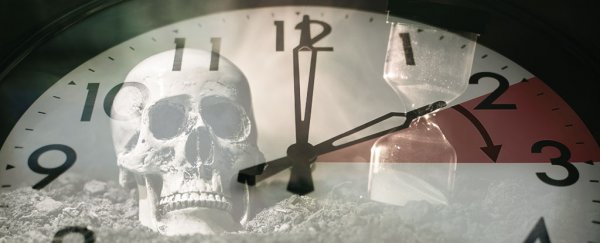Daylight saving time is a killer.
The annual ritual in which we trade an hour of morning light for evening brightness may seem like a harmless shift.
But each year, on the Monday after this springtime switch, hospitals report a 24 percent spike in heart attack visits around the country.
Just a coincidence? Probably not. Doctors see the opposite trend in the fall: on the Tuesday after we turn back the clocks, heart attack visits drop 21 percent as people get a little extra pillow time.
The reason that springing the clocks forward can kill us comes down to interrupted sleep schedules. This Sunday, instead of the clock turning from 1:59 to 2:00 am as usual, it will jump an hour to 3:00 am.
Researchers estimate we'll all deprive ourselves of an extra 40 minutes of sleep because of this.
"That's how fragile and susceptible your body is to even just one hour of lost sleep," sleep expert Matthew Walker, author of How We Sleep, previously told Business Insider.
Walker said this "global experiment" we perform twice a year is a sign of how sensitive our bodies are to the whims of changing schedules: in the fall, the shift is a blessing, and in the spring, it's a fatal curse.
The tragic heart attack trend only lasts about a day, but our bodies may not fully recover from the springtime bump for weeks. We're also prone to make more deadly mistakes on the roads.
Researchers estimate that car crashes in the US caused by sleepy daylight-saving drivers likely cost 30 extra people their lives over the nine-year period from 2002-2011.
"The brain, by way of attention lapses and micro-sleeps, is just as sensitive as the heart to very small perturbations of sleep," Walker explains in his book.
The problems don't stop there. DST also causes more reports of injuries at work, more strokes, and may lead to a temporary bump in suicides at this time of year, too.
For these reasons, states like Florida and Massachusetts are starting to lobby to ditch the switch, as ABC News reports. (Hawaii and Arizona already ignore it.)
Why we 'save' daylight for the evenings
Daylight Saving Time was originally concocted as a way to save energy, and implemented during World War I in Germany.
More recent research suggests it's probably not saving us any megawatts of power at all, but there's some evidence that the evening light can reduce crime and increase the time people spend exercising, at least in certain climates.
But fewer than half of the countries in the world participate in this biannual clock-changing ritual, and the tradition inevitably costs some people their lives.
So while you might enjoy the extra end-of-day light next week, be extra careful with your heart and your car keys.
This article was originally published by Business Insider.
More from Business Insider:
